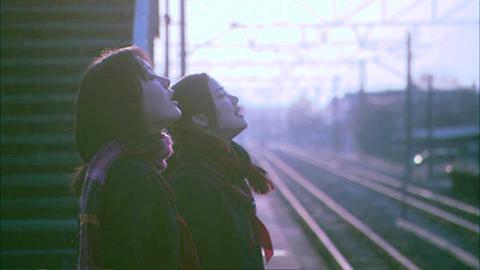The full schedule for the 26th Taipei Golden Horse Film Festival (
The sister event of the film festival, The Golden Horse Awards (

PHOTO COURTESY OF GOLDEN HORSE EXECUTIVE COMMITTEE
To welcome the coming of the Golden Horse, 40 films will be selected for screening in Taichung between Nov. 26 and Dec 5 as a mini version of the Taipei festival.
In Taipei, films will be screened at Warner Village Cinemas in the Xinyi District. The Taichung screenings will take place at the city's Warner Village.
As expected, movie fans have already bought up the special package tickets. The 3,000 limited-edition Rainbow Packages went on sale last Saturday and sold out two days ago. With interest in the festival soaring, organizers expect viewer numbers to reach 100,000.
This year's festival is divided into nine sections: Masterpieces, Panorama, Windows to Asia, Made in Germany, Contemporary Chinese Films, Short Films and Animation, Filmmakers in Focus, 5th International Digital Shorts Competition and a program of the Chinese-language films nominated for the 41st Golden Horse Awards.
This year's Filmmakers in Focus section will pay tribute to Japanese cameraman Noboru Shinoda, Hungarian director Bela Tarr and Hong Kong director Chor Yuen (楚原) for his adaptations of Ku Lung's (古龍) martial arts novels.
Japanese cameraman Noboru Shinoda died because of liver failure in June this year, at the age of 52. Shinoda was an innovator who worked in close partnership with some of Japan's best directors at the height of their careers, notably Shunji Iwai and Shinji Somai. The festival presents Shinoda's most recent collaboration with Iwai, Hana & Alice, a film of extraordinary visual poetry.
Shinoda's first feature film, Crying Out Love, in the Center of the World, topped Japan's box office charts and has grossed over US$75 million there. The film will be released in Taipei on Nov. 12.
Bela Tarr was born in Hungary in 1955 and began shooting films while still at school. He made his directorial debut, Family Nest (1977), at 22. It was an important film that helped form the movement known as "documentary fiction."
Tarr is still active as a filmmaker and is currently in production on his 10th film, The Man From London.
The opening film of the festival is the French flick Dogora. Director Patrice Leconte and his composer Etienne Peruchon will pay a visit to Taipei as special guests. The festival closes with Olivier Assayas' Clean, starring acclaimed Hong Kong actress Maggie Cheung (
International guests confirmed to date included Yoichi Higashi (The Crying Wind) and Yuji Nakae (Shirayuri Club Goes to Tokyo) from Japan; Quark Henares (Keka) from the Philippines; Claude Nuridsany and Marie Perennou (Genesis: The Very Beginning) from France; August Diehl (Love in Thoughts, Distant Light) from Germany; Jorgen Leth (The Five Obstructions) from Denmark; and Andrzej Jakimowski (Squint Your Eyes) from Poland.
Single ticket sales are available to the general public on Nov. 13. Individual tickets cost NT$220, or NT$190 for students.
To avoid difficulty buying tickets, obtain a program booklet of the film festival (already available) at Era Ticketing outlets, Eslite bookstores, FNAC branches and Kingstone Bookstores. For schedules for Taichung screenings, booklets will be available starting from mid November at Taichung Eliste bookstores.
For a full list of films in both Chinese and English, visit the festival Web site: http://www.goldenhorse.org.tw.

Cheng Ching-hsiang (鄭青祥) turned a small triangle of concrete jammed between two old shops into a cool little bar called 9dimension. In front of the shop, a steampunk-like structure was welded by himself to serve as a booth where he prepares cocktails. “Yancheng used to be just old people,” he says, “but now young people are coming and creating the New Yancheng.” Around the corner, Yu Hsiu-jao (饒毓琇), opened Tiny Cafe. True to its name, it is the size of a cupboard and serves cold-brewed coffee. “Small shops are so special and have personality,” she says, “people come to Yancheng to find such treasures.” She

The low voter turnout for the referendum on Aug. 23 shows that many Taiwanese are apathetic about nuclear energy, but there are long-term energy stakes involved that the public needs to grasp Taiwan faces an energy trilemma: soaring AI-driven demand, pressure to cut carbon and reliance on fragile fuel imports. But the nuclear referendum on Aug. 23 showed how little this registered with voters, many of whom neither see the long game nor grasp the stakes. Volunteer referendum worker Vivian Chen (陳薇安) put it bluntly: “I’ve seen many people asking what they’re voting for when they arrive to vote. They cast their vote without even doing any research.” Imagine Taiwanese voters invited to a poker table. The bet looked simple — yes or no — yet most never showed. More than two-thirds of those

In July of 1995, a group of local DJs began posting an event flyer around Taipei. It was cheaply photocopied and nearly all in English, with a hand-drawn map on the back and, on the front, a big red hand print alongside one prominent line of text, “Finally… THE PARTY.” The map led to a remote floodplain in Taipei County (now New Taipei City) just across the Tamsui River from Taipei. The organizers got permission from no one. They just drove up in a blue Taiwanese pickup truck, set up a generator, two speakers, two turntables and a mixer. They

Former Chinese Nationalist Party (KMT) chairwoman Hung Hsiu-chu’s (洪秀柱) attendance at the Chinese Communist Party’s (CPP) “Chinese People’s War of Resistance Against Japanese Aggression and the World Anti-Fascist War” parade in Beijing is infuriating, embarrassing and insulting to nearly everyone in Taiwan, and Taiwan’s friends and allies. She is also ripping off bandages and pouring salt into old wounds. In the process she managed to tie both the KMT and the Democratic Progressive Party (DPP) into uncomfortable knots. The KMT continues to honor their heroic fighters, who defended China against the invading Japanese Empire, which inflicted unimaginable horrors on the